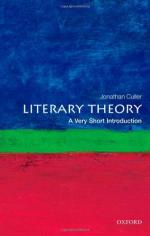
|
| Name: _________________________ | Period: ___________________ |
This test consists of 15 multiple choice questions and 5 short answer questions.
Multiple Choice Questions
1. For what type of performative theory was Judith Butler known?
(a) Roles in the workforce.
(b) Religious phrasing.
(c) Gender and sexuality.
(d) Political climate.
2. According to Chapter 5, what is the goal in using a metaphor?
(a) To confuse with whimsy.
(b) To outrage the reader.
(c) To make the reader think.
(d) To invoke emotion.
3. According to Culler, what do many novels teach about heartache?
(a) It is the end of life.
(b) It is not common.
(c) It is fleeting.
(d) It is part of life.
4. In Chapter 7, performative language phrases are not required to be _____________.
(a) Intra-dependent.
(b) Popular.
(c) Interesting.
(d) None of these.
5. According to Cullers in Chapter 6, what form of literature has been studied the most in the 20th century?
(a) Novels.
(b) Non-fiction.
(c) Plays.
(d) Poetry.
6. Instead of providing tested solutions, Culler teaches that theory aims to ____________.
(a) Refute these solutions.
(b) Eliminate shortcomings.
(c) Stimulate thought.
(d) Revolutionize literature.
7. In literature, what is it called when events take place opposite of expectation?
(a) Point of view.
(b) Alliteration.
(c) Irony.
(d) Flashback.
8. What should a novel be according to Mikhail Bakhtin?
(a) Polyphonic.
(b) Poetic.
(c) Short.
(d) Singular.
9. According to Chapter 6, what type of narrator do readers most trust?
(a) An honest narrator.
(b) An unbiased narrator.
(c) A well-known narrator.
(d) An educated narrator.
10. According to Chapter 6, what do strong characters encourage readers to imagine?
(a) Other people's lives.
(b) How to be better writers.
(c) The conclusion of the story.
(d) A proper literary form.
11. In Chapter 8, what forms of entertainment encourage feelings and virtue?
(a) Television.
(b) All of these.
(c) Film.
(d) Literature.
12. In Chapter 7, what is a requirement for the believable appearance of literary performatives?
(a) Writing.
(b) Proper story format.
(c) Discussion.
(d) Publication.
13. According to Chapter 5, how should poems be read?
(a) In private.
(b) In sections.
(c) All at once.
(d) By the author.
14. According to Culler, what is rhetoric?
(a) The study of language technique.
(b) The study of poetry.
(c) The study of fictional essays.
(d) The study of scholarly rules.
15. What human need, according to Culler, drives the desire to hear the conclusion of a story?
(a) The need for conflict.
(b) The need for love.
(c) The need for resolution.
(d) The need for knowledge and understanding.
Short Answer Questions
1. According to Chapter 7, why can the study of utterances be confusing?
2. What era defined rhetoric as the study of structuring powers for discussion?
3. What is accomplished by literary performatives, according to Culler?
4. When a narrator only knows certain things, what is the narration called?
5. According to some psychological studies, identity is formed based on the first memory of _____________.
|
This section contains 444 words (approx. 2 pages at 300 words per page) |

|




